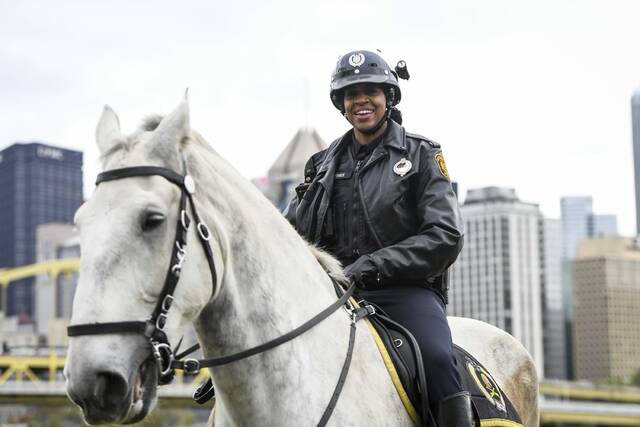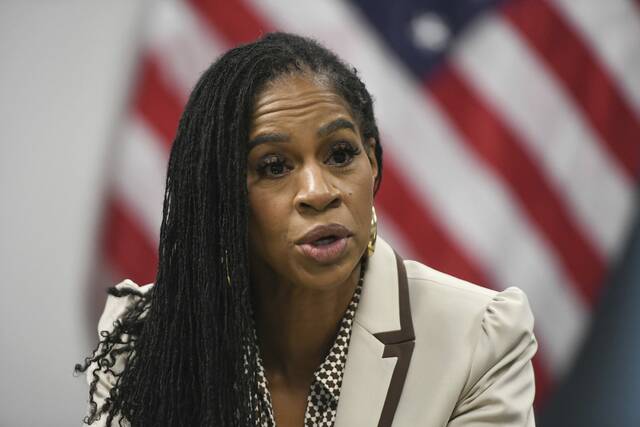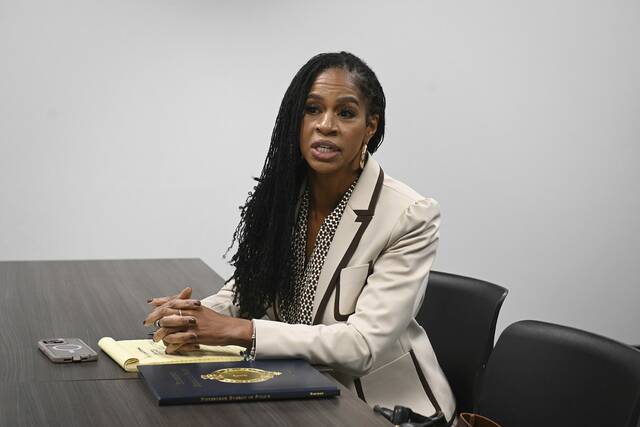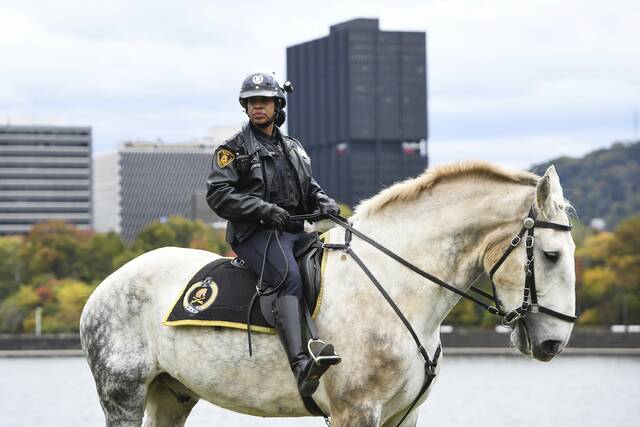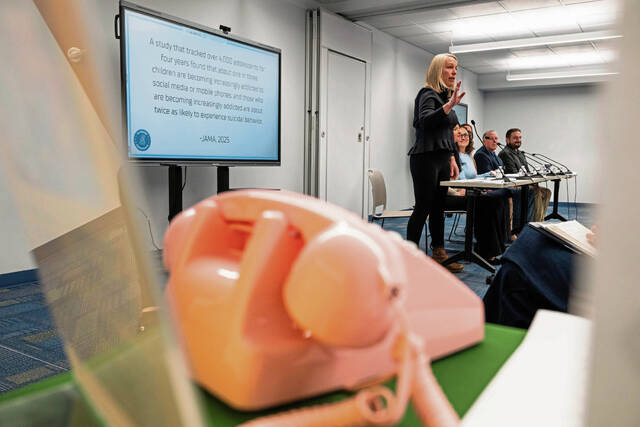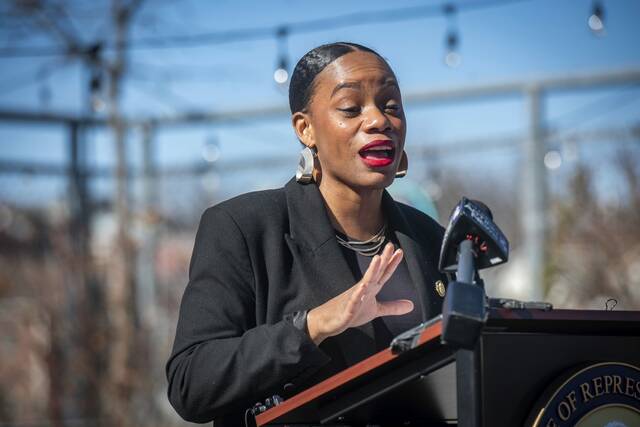Pittsburgh police Detective Dorothea Leftwich didn’t plan out her newest assignment.
Leftwich, a mother of three known by many as “Dea,” patrolled neighborhoods and worked stints with narcotics and burglary units after joining Pittsburgh’s force in 2007. For the past 12 years, she’s been working full-time in the bureau’s Office of Municipal Investigations.
An email that landed in Leftwich’s inbox this spring, however, propelled the Erie County native into Pittsburgh history: she was recently appointed the first Black woman to serve on the bureau’s mounted unit.
“Out of nowhere, that email popped up: ‘They’re looking for mounted officers and you can apply’ … When that came, I was elated,” Leftwich said. “I wanted to ride — my sights were never to make history. I was drawn to the unit because the work’s admirable.”
Leftwich first rode “draft horses,” large breeds intended for heavy work like plowing fields, while growing up in Girard, Pa., a suburb halfway between Erie and the state’s border with Ohio. Hers was one of the only Black families in town.
In school in northwestern Pennsylvania, Leftwich displayed her athleticism in basketball and track and field. She still holds Girard High School Yellow Jackets records for the 200- and 400-meter races and was named this year to the district’s “hive of fame.”
That athleticism — and her daily drive to keep fit — hasn’t faded, friends and colleagues said. But Leftwich’s interest in horses only rekindled recently when she started volunteering at a Murrysville stable. Three weeks of private lessons followed to prepare for the mounted unit test.
‘We’re proud to see her make history’
On Aug. 10, Leftwich drove to stables at Riverview Park on the city’s North Side and ground-mounted a massive horse standing “18 hands,” or about six feet, tall. Its hooves were the size of basketballs. Leftwich displayed her command of the animal while “riding English” — equestrian-speak for “without a saddle.”
“You had to show your abilities,” Leftwich said. “And horses can sense your heart rate. I wasn’t nervous because I knew I needed to be calm to control the horse.”
A month later, Leftwich was named one of eight new part-time officers in the squad.
Pittsburgh police Commander Eric Baker, who leads the division that includes the mounted unit, called Leftwich’s appointment “an inspiring milestone.” He added that diversity will help improve the unit’s adaptability and problem-solving skills.
“Her professionalism and dedication set a standard within the bureau,” Baker told TribLive. “We’re proud to see her make history — and open the door for others who will follow in her path.”
Heather Copenhaver wasn’t surprised at all by the news.
The former Pittsburgh police officer trained in the academy with Leftwich — who, like Copenhaver, was leaving a desk job to become a cop. She also saw how the mounted unit controlled crowds during the G20 Pittsburgh Summit in 2009.
“I’ve seen what those horses can do, how they can take control of a situation,” said Copenhaver, who today lives in Fox Chapel and works for Carnegie Mellon University.
History of the unit
Once Leftwich made history, she started to delve deeper into its details.
Leftwich learned that the police bureau founded its mounted unit in 1886, a century after Pittsburgh incorporated as a borough protected by a constable and a night watch. The first officer to join “the Black Horse Mounted Squad,” a man nicknamed Lemon Grimes, had fought in the Civil War, Leftwich said.
Pittsburgh budget cuts initially put an end to the mounted unit in 2003. But, it reformed in 2017 and is funded in next year’s city budget.
Integration didn’t begin in Pennsylvania with horses. Black men and women started serving in law enforcement here in the second half of the 20th century, some inspired by the Civil Rights Movement.
“I’ve never found an official document or general advisory that says, ‘We’re never going to have a Black person,’ so it had to be unwritten,” said historian Tom Memmi of the Pennsylvania State Police Museum. “It took the efforts of the governor to say, ‘Let’s try this. Let’s do this.’ ”
Gov. John Syndney Fine appointed John R. Dudley as the first Black state trooper in Pennsylvania in 1954, Memmi said.
Benjamin Brooks and his friend, Richard McDowell, became the first Black men to pass the state police force’s competitive exam shortly after Dudley’s appointment.
“Coming on, it was new for everybody and there was a period of adjustment there,” said Brooks, now 86, a North Carolina native who lives in Philadelphia. “Was there opposition? Yes, there was opposition … we were not always welcome.”
Brooks remembers what one trooper told him in a Lancaster County barracks: “It’s okay for you guys to be here. But we don’t want any more.”
In 1963, just a year after joining the force, Brooks was the only Black state trooper sent to integrate Folcroft, a Philadelphia suburb. Law enforcement was needed to help the Bakers, a Black family, move into what had been a segregated town.
“I was there to witness the howling mob screaming epithets at me,” Brooks said. “I found it interesting.”
The first Black woman to serve as a Pennsylvania trooper, Verna Dorsey, joined the force in 1973, historians said. Nearly 20 years after that, Brooks retired from the police force with the rank of major.
Few written records exist about those who broke color barriers in Pittsburgh.
Chris Johnson, the first — and, until Leftwich’s appointment around Labor Day, the only — Black officer to join the mounted unit served in the early 1990s, police spokeswoman Cara Cruz said. Today, about 11% of the police bureau’s officers are Black.
Amera Gilchrist and Lisa Epps-Cuda are familiar with breaking down barriers.
Epps-Cuda became one of the first Black women to become a Pittsburgh firefighter in 1990. Gilchrist joined Pittsburgh EMS about nine years later; in 2023, she was sworn in as the first Black woman to lead the emergency services bureau.
“I used to step off an ambulance and people were in awe, like they never saw a Black woman EMT before — and that seemed crazy to me,” Gilchrist said. “Somebody’s got to be the first so we don’t have to keep having this conversation.”
“We are moving forward, but, for me, it can’t move fast enough to bring more diversity on,” Epps-Cuda added. “I swore to the chief that I wouldn’t leave until I could hand that torch to another woman of color.”
The third Black woman to become a Pittsburgh firefighter joined the squad in 2024, Epps-Cuda said.
A Black woman joining the police force’s mounted unit “should’ve happened years ago,” she added. “There should be no public safety group where you’re the first of anything anymore … but Dea is doing this and I’m so proud of her.”
Leftwich wasn’t eyeing history when she sought the part-time assignment on the mounted unit. But she takes the honor seriously.
“It’s a reminder that representation matters,” Leftwich said. “My job is to open a door that others can walk through.”


